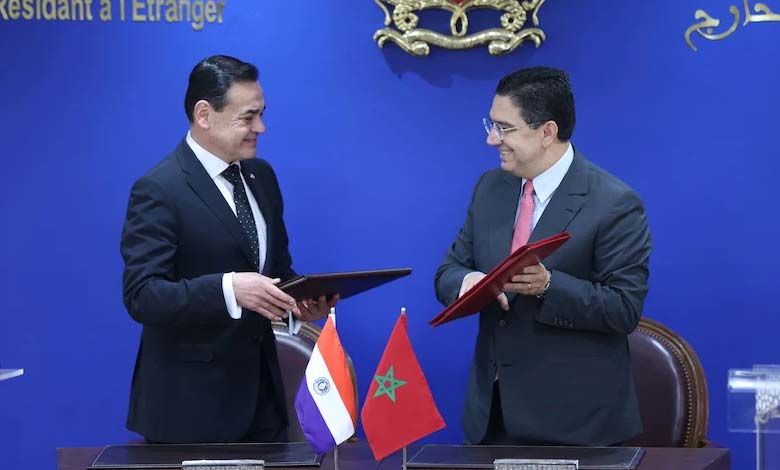Paraguay Demonstrates Its Support for Morocco’s Sovereignty over the Sahara by Opening a Consulate in the Southern Provinces

With this announcement, Morocco once again affirms its position as a rising diplomatic power in the Global South, capable of combining historical legitimacy with international legality.
In a new move that reinforces the growing international support for Morocco’s sovereignty over the Sahara, the Republic of Paraguay has announced its decision to open a general consulate in the Kingdom’s southern provinces. This step reaffirms its recognition of Morocco’s sovereignty over its entire national territory and marks a significant stage in the political and diplomatic partnership between Rabat and Asunción.
-
King Mohammed VI’s Vision: Morocco’s Rise through Justice and Balance
-
The World Bank chooses Morocco as a regional headquarters for its stability and strong economy
Observers view this announcement as carrying deep political significance, symbolizing a qualitative shift in the positions of Latin American countries, which now regard Morocco’s approach as a strategic choice for regional stability and shared development. Paraguay had withdrawn its recognition of the so-called “Sahrawi state” in 2014, and since then, both nations have strengthened their political dialogue and developed solid economic and cultural partnerships.
The decision was announced following official talks between Nasser Bourita, Morocco’s Minister of Foreign Affairs, African Cooperation, and Moroccan Expatriates, and his Paraguayan counterpart Rubén Ramírez Lezcano, who reaffirmed that his country views Morocco’s 2007 autonomy initiative as the only serious and realistic framework for resolving the regional dispute over the Sahara.
-
Washington urges U.S. companies to invest in Morocco’s Sahara
-
New Diplomatic Achievement for Morocco with Its Election as Vice-President of the Conference on Landlocked Developing Countries
Analysts emphasize that the move goes beyond symbolic diplomacy. It represents a strategic breakthrough for Morocco in Latin America, a region that has long displayed mixed positions on the Sahara issue. Following Bolivia, Chile, Guatemala, and the Dominican Republic, Paraguay now joins the growing list of nations that have translated their political support into concrete action through the opening of consulates or cooperation agreements in the southern provinces.
The upcoming visit of Paraguayan President Santiago Peña Palacios to Rabat is expected to further strengthen this cooperation, particularly in the fields of energy, agriculture, and higher education—illustrating Morocco’s vision of turning political recognition into tangible economic and investment partnerships.
-
Portuguese support for Morocco’s Sahara plan strengthens the Kingdom’s position
-
26th Anniversary of the Throne Day in Morocco: Diplomacy of Empowerment and Balance
This development is part of a broader diplomatic momentum that Morocco has been leading for several years. The number of countries that have opened consulates in Laayoune and Dakhla is now approaching forty, spanning Africa, the Arab world, Asia, and Latin America. This geographic expansion of support for Morocco’s sovereignty over the Sahara highlights the Kingdom’s success in earning its partners’ trust through a clear strategy of South-South cooperation and genuine development projects that have turned the southern provinces into a model of stability and economic progress.
This diplomatic progress is closely linked to the evolving international stance within the United Nations and the Security Council, where Morocco’s autonomy plan now enjoys broad recognition as the only realistic and achievable solution. Successive UN resolutions have emphasized the seriousness of the Moroccan proposal, while calls for unrealistic options such as independence or an impractical referendum have significantly diminished.
-
France Turns Words into Action in Support of Morocco’s Sovereignty Over the Sahara
-
Morocco’s Atlantic Project: A Lifeline from Crisis for Sahel Countries
A Royal Vision Redefining the Map of Global Support
These achievements reflect the insightful diplomacy led by King Mohammed VI, based on clarity in defending national unity and constructive openness to regional and international partners. Through Morocco’s active participation in African, regional, and Latin American summits, Rabat has built lasting alliances that transcend temporary political circumstances, creating a new paradigm where investment in development and human cooperation serves as a foundation for enduring political support.
With Paraguay’s announcement, Morocco’s stature is reaffirmed as a rising diplomatic force in the Global South—one that combines historical legitimacy with international legitimacy, transforming growing political support into an enduring institutional presence in one of the most sensitive issues in the Maghreb region.












